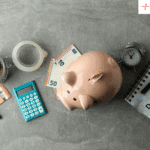If you are lucky enough to get a refund from your tax return you are likely trying to decide what you should do with your new windfall… should you spend or save it?
A TD Ameritrade survey released last month found that 47 percent of those expecting to get a refund plan to make an addition to their savings account with it, while 44 percent plan to use the money to reduce debt. About 28 percent plan to spend at least some on necessities and 15 percent plan to splurge on some kind of indulgence.
It’s common for most of us to spend a little more than usual when we get a check from good ole Uncle Sam but this extra cash could be just what you need to get your financial train back on its track. Since you will likely spend some (if not all) of your tax return, let’s take a look at a few ways to put that new found money to best use.
Resist Temptation
If your financial situation is relatively stable, you are probably tempted to indulge in a big ticket item that you have had your eye on for some time now. However, before you race over to the electronics super store and pick up that 60″ flat screen you have been drooling over, take a moment to consider how that money could go towards supporting your long-term financial goals. If you are saving for that new house or car, or are working on reducing your credit card balances, that money would help in reaching your objective that much sooner. If you have your mind set on buying that new TV, or whatever the temptation, consider sitting some money aside and start a “New TV” fund, make monthly contributions to it with any discretionary money left over from paying the monthly bills.
Pay Off Some Debt
It’s my opinion that the best use of your tax refund would be to pay off some debt. I’m not saying that your entire refund should go towards your debt (although that is probably the smartest thing to do), but it makes good financial sense to get rid of as much of your debt as soon as possible. If you consider how long it would take you to reduce a credit card balance a $1000 by paying the minimum payment as opposed to a $1000 lump sum, it’s a no-brainer!
Add to or Start Your Emergency Fund
Without an emergency fund, most people are only a couple of paycheck away from financial disaster should a life changing event happen suck as a serious illness of loss of work. Your emergency fund should contain at least six months’ worth of your monthly obligations… ideally a year’s worth.
Spend it on a Necessity
If you are going to spend your tax return, or at least some of it, spend it on something that you have been putting off doing for lack of money. I’m not talking about that 60″ TV again, I mean something that is important like getting that dental work done that you have been putting off or new tires for the family car.
Increase the Value of Your Home
If you have your finances in order and have taken care of that looming debt, now might be a good time to make some improvements to your home. Remodeling your kitchen or bathroom can increase not only the value of your home but the enjoyment you receive from have a nice, new addition to your home.
Add to Your Retirement Savings
Now that you have some extra money, after you have paid down your debt of course, you can make a contribution to your IRA or other retirement accounts. If you have not started a retirement account, now is the perfect time to do so.
Treat Yourself
If after you have paid down debt and added to your retirement account, you might consider treating yourself to a leisurely indulgence… just don’t overdo it. To avoid blowing all of your tax return on a treat for yourself, set aside a percentage of your return, say 10 percent for yourself and use the other 90 percent on the important things.
As hard as it might be, be vigilance in becoming debt free and financially responsible.





